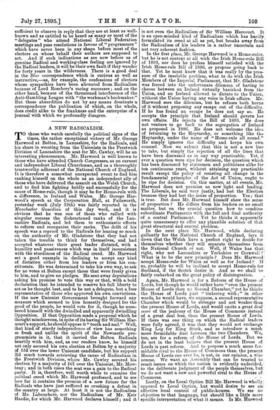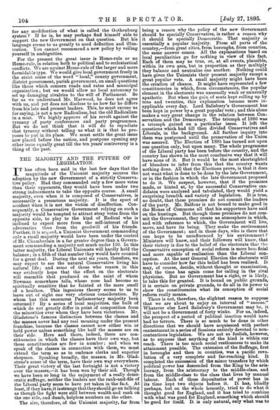A NEW RADICALISM.
TO those who watch carefully the political signs of the times, the rather exceptional victory of Mr. George Harwood at Bolton, in Lancashire, for the Radicals, and his share in wresting from the Unionists in the Prestwich Division of Lancashire the seat for Mr. Cawley, Mill be an interesting phenomenon. Mr. Harwood is well known to those who have attended Church Congresses, as an earnest and independent Liberal Churchman, and as a thoroughly trustworthy adherent of the National Church of England. It is therefore a somewhat unexpected event to find him ranking himself on the whole as an independent :ally of those who have delivered the assault on the Welsh Church, and to find him fighting boldly and successfully for the cause of Home-rule, though it may be for Home-rule with a difference, in Ireland and Wales. Mr. George Har- wood's speech at the Corporation Hall, at Failsworth, yesterday week (July 19th) was fairly reported in the Manchester Guardian of this day week, and it is obvious that he was one of those who rallied with singular success the disheartened ranks of the Lan- cashire Radicals, and led them to enthusiastic efforts to reform and reorganise their ranks. The drift of his speech was a reproof to the Radicals for leaning so much on the authority of Mr. Gladstone that they had not taken the trouble to think for themselves, and had accepted whatever their great leader dictated, with a humility and passiveness which was in itself inconsistent with the sturdiness of the Radical creed. Mr. Harwood set a good example in declining to accept any kind of dictation either from his leaders or from his con- stituents. He was determined to take his own way, to ask for no votes at Bolton except those that were freely given to him, and to give no pledges. He sent away deputations asking his promise to vote this way or that, with a bold declaration that he intended to reserve his full liberty to act as he thought best, and to be not a delegate, but a free representative of those who approved his own convictions. If the new Unionist Government brought forward any measure which seemed to him honestly designed for the good of the people, he would vote for it, though he num- bered himself with the dwindled and apparently dwindling Opposition. If that Opposition made a proposal which he thought mischievous, in spite of its having Sir William Har- court's support, he should oppose it " tooth and nail." Well, that kind of sturdy independence of view has something 30 fresh and unlike the spirit of the Newcastle pro- grammists in it, that it carried the Bolton Radicals heartily with him, and, as our readers know, he himself not only secured his own election at Bolton by a majority of 552 over the lower Unionist candidate, but his support lid much towards retrieving the cause of Radicalism in the Prestwich Division, where Mr. Cawley secured his election by a majority of 101 over the Unionist, Mr. Mow- bray ; and in both cases the seat was a gain to the Radical party. It is, therefore, well worth while to examine the political creed which Mr. Harwood professed, and to see how far it contains the promise of a new future for the Radicals who have just suffered so crushing a defeat in the country at large. At least it is not the Radicalism of Mr. Labouchere, nor the Radicalism of Mr. Heir Hardie, for which Mr. Harwood declares himself ; and it is not even the Radicalism of Sir William Harcourt. It is an open-minded kind of Radicalism which has hardly formulated its creed at all as yet, but breaks away from' the Radicalism of his leaders in a rather uncertain and not very coherent fashion.
In the first place, Mr. George Harwood is a Home-ruler, but he is not content at all with the Irish Home-rule Bill of 1893, nor does he profess himself satisfied with the Irish Home-rule Bill of 1886, or propose going back to that. Yet he must know that it was really by the pres- sure of the insoluble problem, what to do with the Irish Members of the Imperial Parliament, that Mr. Gladstone was forced into the unfortunate dilemma of having to choose between an Ireland virtually banished from the Union, and an Ireland allowed to dictate to the Union, without the Union having any voice in Irish affairs. Mr.
Harwood sees the dilemma, but he refuses both horns of it without proposing any escape out of the difficulty. If he has found an escape he does not say so. He accepts the principle that Ireland should govern her own affairs. He rejects the Bill of 1893. He does not venture to go back to the segregation of Ireland as proposed in 1886. He does not welcome the idea of returning to the Heptarchy, or something like the Heptarchy, under the name of " Home-rule all round."
He simply ignores the difficulty and keeps his own counsel. Now we submit that this is not a new line to take, but simply the rejection of all the lines that have been discussed as in any way practicable. Yet, if ever a question were ripe for decision, the question which has been discussed by statesmen and politicians alike for ten continuous years, without attaining any practicable result except the policy of resisting all change in the fundamental principles of the Act of Union, ought to be ripe for decision. On this matter, at all events, Mr.
Harwood does not promise us new light and leading. The Liberals, he said very justly, had lost the Election because they had lost the sense of proportion. Yes ; that is true. But does Mr. Harwood himself show the sense of proportion ? He differs from his leaders on no small matter, but on the crucial question how to combine subordinate Parliaments with the full and final authority of a central Parliament. Yet he thinks it apparently quite unnecessary to offer any plausible solution of that great structural and central problem.
In the next place Mr. Harwood, while declaring gallantly for the National Church of England, lays it down that the Welsh have a perfect right to decide for themselves whether they will separate themselves from the National Church or not. Well, if Wales has that, right, why not Lancashire or Yorkshire or Cornwall ?'
What is to be the new principle ? Does Mr. Harwood accept Home-rule for Wales as well as for Ireland ? If so, probably he will be inclined to accept Home-rule for Scotland, if the Scotch desire it. And so we shall be fairly embarked on the great policy of disintegration. • Again, Mr. Harwood is for a Reform of the House of Lords, but though he would rather have " even the present House of Lords than no Second Chamber," yet he thinks the House of Lords past " tinkering with ;" in other words, he would have, we suppose, a second representative Chamber which would be stronger and not weaker than the present House of Lords, and would excite a great deal more of the jealousy of the House of Commons instead of a great deal less, than the present House of Lords. If there was one thing on which the Radical leaders were fully agreed, it was that they would not exchange King Log for King Stork, and so introduce a ranch more formidable duel between the two Chambers. We, too, are for a reform of the House of Lords. But we do not in the least believe that the present House of Lords is past reform. And to propose a much more for- midable rival to the House of Commons than the present House of Lords can ever be, is uot, in our opinion, a wise course. We want an Assembly that can be trusted to remit issues on which the nation is evidently undecided,' to the deliberate judgment of the people themselves, but we do not want a new and powerful rival to the House of Commons.
Lastly, on the Local Option Bill Mr. Harwood is wholly'; opposed to Local Option, but would desire to see au effective local control of public-houses. We see no objection to that language, but should like a little more specific interpretation of what it means. Is Mr. Harwood for any modification of what is called the Gothenburg system ? If he is, he may perhaps find himself able to support the new Government on that question. But his language seems to us greatly to need definition and illus- tration. You cannot recommend a new policy by veiling yourself in ambiguities.
For the present the great issue is Home-rule or no Home-rule, in relation both to political and to ecclesiastical conflicts. We are against Home-rule of the larger and more formidable type. We would give local government freely in the strict sense of the word " local," county government, district government, parish government, on small questions like those which concern roads and rates and municipal organisation ; but we would allow no local autonomy to set up damaging rivalries to the will of Parliament. So far as we understand Mr. Harwood, he does not agree with us, and yet does not disclose to us how far he differs from his late and present leaders. This, he must excuse us for saying, is not a new Radicalism, but the old Radicalism in a mist. We highly approve of his revolt against the tyranny of party conferences and party programmes. But we do not think that it will do to repudiate that tyranny without telling us what it is that he pro- poses to put in its place. We must settle the great issue now placed before the nation, and postpone opening any other issue equally great till the ten years' controversy is a thing of the past.



































 Previous page
Previous page